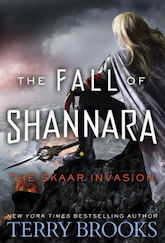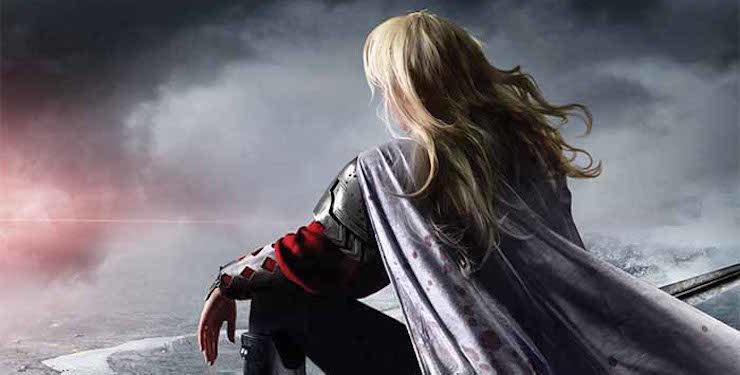I’ve written at length about not only what Terry Brooks means to the epic fantasy genre, but to me personally as a reader. His books blew the doors off the world I first discovered via Tolkien, but it was his generosity and kindness towards a young writer at Surrey International Writer’s Conference that set me on the path I travel today. Brooks is one of fantasy’s most prolific novelists, having written over 30 novels. Since 1996, he’s produced a novel a year—the release of which has become something of an event for me. Despite some inconsistency in quality over the years, I eagerly look forward to his new books, especially the Shannara novels.
Last year’s The Black Elfstone, which was the start of a new Shannara sub-series, The Fall of Shannara, was notable for many reasons. To begin with, it was promised to be the opening volume in a four-book series that will (chronologically) conclude the long-running epic fantasy. It was also one of Brooks’ best novels, a return to form after a handful of smaller scale, less impactful Shannara novels. In my review, I said:
The Black Elfstone brings to mind the days when a young Terry Brooks saved epic fantasy, and proves that 40 years later, he’s still got it. It has epic scope, heroic characters, and so much heart. The series might be called The Fall of Shannara, but The Black Elfstone is proof that the Shannara series can still reach new heights.
Buy the Book


The Fall of Shannara
That’s a lot for a sequel to live up to, but I’m pleased to say that The Skaar Invasion is not only a worthy follow-up to The Black Elfstone, it’s further proof that Brooks is in the midst of writing a classic instalment of the long-running Shannara series. If the quality keeps up, The Fall of Shannara series will sit alongside Brooks’ best works, like The Elfstones of Shannara and The Heritage of Shannara. In fact, The Fall of Shannara echoes that latter series in more ways than just quality.
Shannara has always been inward-looking, caught in the past, but, in recent years, with a few particular series, Brooks has embraced his most successful books by returning to their themes and structures, and reexamining them in the context of a more socially- and scientifically-advanced Four Lands. Shannara has long examined history’s cyclical nature, and, as science and magic head toward an inevitable showdown, with the sake of the Four Lands on the line, it’s fascinating, and nostalgic, to be reminded of the series’ early days and most exhilarating moments.
The Dark Legacy of Shannara series, and Bloodfire Quest in particular, was a throwback and direct sequel to what is perhaps Brooks’ most celebrated Shannara novel: The Elfstones of Shannara. By that measure, The Fall of Shannara is a throwback to the most epic period in Shannara series, The Heritage of Shannara. This is recognizable not just in The Fall of Shannara’s epic scale, but also in its themes of political upheaval, xenophobia, the cost of power. Even its major plotlines echo those of The Heritage of Shannara: a pair of Ohmsford descendants, a rebel group facing an authoritarian government, a search for the Black Elfstone, and restoring Paranor and the Druids to the Four Lands. It’s all there. In the past, I’ve criticized Brooks for returning to the same inkwell too often, and writing novels that are derivative of his past work, but here, like in The Dark Legacy of Shannara, it works by shifting reader expectations, and providing new answers to old questions.
The Skaar Invasion focuses on two themes that are familiar to anyone following the news in 2018: climate change and the collision between xenophobia/nationalism and immigration. “Besides, this wasn’t Elven business,” laments a young Elven prince, Brecon Elessedil, midway through The Skaar Invasion. “For a long time now the Elves have been withdrawing further from the other Races, having less and less to do with them. Save for the Dwarves, with whom we still interact regularly, we share almost nothing with the rest of the Four Lands.” The Black Elfstone told the story of a mysterious, magical army invading the Four Lands. In its sequel, we learn that this army comes from a far-off nation called Skaarland. The Skaar are deadly warriors, but their commander, Ajin d’Amphere, is also politically- and socially-conniving, working tirelessly to pit Four Lands ally against ally, until they realize the true threat too late. Despite being a prince, Brecon despairs at the isolationist leadership of his people, which he has little control over. He continues:
“I did what I could, Dar. I don’t believe in isolation as either a political or economic policy. But these days, I am definitely in the minority. And the Druids had no use for us other than to keep pressuring us to let them take control of our magic. … The Federation is no better. They want the same things from us as the Druids, except their plan is to see magic eradicated from the Four Lands completely. They would see us eradicated, as well, if they could find a way to make it happen. To take our magic is to steal our heritage.”
Early on, readers discover that the Skaar are fleeing their homeland, which, due to climate change, is undergoing a transition to eternal winter. It’s beyond the point of reparation, and so, we find out, the unstoppable army tearing a bloody path through the Four Lands in The Black Elfstone is only a small expeditionary force laying the groundwork for a full-on invasion. However, in a first for the Shannara series, Brooks has written a human point-of-view character from outside the Four Lands. Ajin d’Amphere is ostensibly the antagonist of the book, but she’s also a conflicted leader and empathetic character. She’s forced into the role of bad guy, and, even from the novel’s early pages, you can see the beginnings of a convergence between her motives and those of the protagonists (even if they don’t yet realized it). The true threat to the Four Lands is not Ajin d’Amphere and her army, but the ego-driven, xenophobic leaders and societies that refuse to work together to overcome mutual conflicts.
“The damage to our people is unimaginable,” d’Amphere tells Darcon Leah early in the novel, revealing the desperate motives of the Skaar invasion. “We are dying, our numbers reduced from millions to thousands. Our most vulnerable—our children, our old and sick, those weakened already from thirst or hunger—die every day. I have watched people I have known all my life perish. I watched by nurse and my favorite childhood playmates die. My dogs. My soldiers…”
The world is in peril, headed toward destruction, its course almost irreversible, but instead of working together, the people of the Four Lands, and those beyond its borders, are headed toward a bloody confrontation.
“There’s been enough bloodshed,” a blacksmith tells Tarsha Kaynin, a wishsong-wielding descendant of Shea Ohmsformd, at one point, and you sense through his words all the pain that the Four Lands have suffered through generations of conflict—since the atomic Great Wars rained death and destruction on our world, and, generations later, the remnants of humanity crawled from the ashes, and took the first step on the path toward cyclical self-destruction.
[Drisker Arc] remembered. All those hours spent reading the Druid Histories. Just ancient legends and useless information from times dead and gone, the other Druids had scoffed. Nothing there will help you with the present. Studying the world around you is all that matters. There is nothing to be learned by studying what’s over and done with.
Except that those who fail to pay attention to the past are doomed to repeat it.
Brooks isn’t subtle, and his workmanlike prose doesn’t hide secrets, instead displaying the politics and themes openly, but there are some important messages in these books, and, considering them in context of the series’ past, they raise the Shannara series to new heights. The Fall of Shannara is the conclusion to the Shannara series, but it’s also a culmination of ideas and explorations that have been with the series from its earliest days. It doesn’t provide answers (yet), but it does lay bare Brooks’ heart, and reveals the kindness within.
One of The Skaar Invasion’s most exciting additions to the Shannara series is that it provides a glimpse at nations outside the Four Lands. Not dead, ruined Parkasia, with its AI-driven technologies and scattered tribes, which we learned little about in Antrax, but full-blown, developed societies. A whole continent of people and cultures. An untold history. It seems almost unfair that here, on the verge of the series’ conclusion, we finally see a glimpse of how large and boundless Brooks’ world really is.
The Four Lands has grown and changed tremendously since The Sword of Shannara debuted over 40 years ago, and one of the greatest pleasures of having read the series since adolescence is to reflect on those changes. The once mighty Tyrsis is now a crumbling ruin. Varfleet, meanwhile, was small and inconsequential early in the series, and is now a vital centre for trade and culture. The once empty, rolling hills of Leah, the quiet mountainous Eastland, the verdant, endless forests of the Westland, are abuzz with the noise of progress. Arishaig, which didn’t exist for the first dozen novels, is now the imposing capital of the Federation.
Shea shifted to a sitting position and peered through the open viewport at a sight that left him breathless. For as far as they eye could see, buildings of all sized and shapes sprawled across the landscape. Those closest were fewer and more widely spread apart, many of them attached to fields or pasturelands. Farther on, dirt roads rutted and narrow gave way to ones that were smoother and wider, some covered with paving stones and some graveled, and the homes became residences clustered more closely together.
It wasn’t until well beyond the outlying buildings that the city walls appeared—sizeable to begin with, but growing steadily larger as they approached. These formidable barriers encircled the city proper—huge and sheer and bracketed by weapons towers and landing pads on which various types of airships were settled. Some were huge battle cruisers, some flits and Sprints, but all were at the ready.
…
“They always built the strongest walls for themselves, the rich and powerful,” Rocan muttered, his bitter words so soft the boy almost didn’t catch them. “They always protect themselves, even if it’s at the expense of others.”
Like The Black Elfstone before it, and perhaps even moreso, The Skaar Invasion is one of Brooks’ most aggressively political novels. It engages with familiar conflicts and themes, digging deep into the challenges facing humanity and asking—begging—for us to do better. Be more kind. Learn from the past. Work together for a better future.
Previously, I’ve recommended The Dark Legacy of Shannara to newcomers looking to experience Brooks’ work for the first time. While The Fall of Shannara works similarly well for newcomers, it’s greatest delights are only available to fans who have grown-up with the series, a love letter to Brooks’ greatest accomplishments. The Skaar Invasion is and exhilarating, intricate portrait of a world at war with itself.
The Skaar Invasion is available from Del Rey.
Aidan Moher is the Hugo Award-winning founder of A Dribble of Ink, author of “On the Phone with Goblins” and “The Penelope Qingdom”, and a regular contributor to Tor.com and the Barnes & Noble SF&F Blog. Aidan lives on Vancouver Island with his wife and daughter, but you can most easily find him on Twitter @adribbleofink and Patreon.










